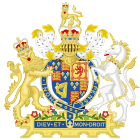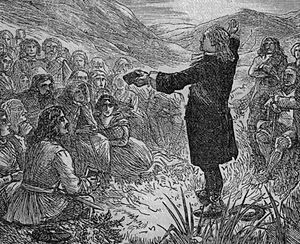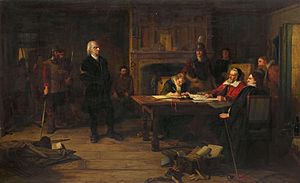Conventicle Act 1664 facts for kids
| Act of Parliament | |

|
|
| Long title | An Act to prevent and suppresse seditious Conventicles. |
|---|---|
| Citation | 16 Cha. 2. c. 4 |
| Dates | |
| Royal assent | 17 May 1664 |
| Commencement | 16 March 1664 |
| Expired | 19 December 1667 |
| Repealed | 28 July 1863 |
| Other legislation | |
| Repealed by | Statute Law Revision Act 1863 |
|
Status: Repealed
|
|
| Text of statute as originally enacted | |
The Conventicle Act of 1664 was a law passed by the Parliament of England. It made it illegal for more than five people (who weren't from the same family) to gather for religious meetings outside the official Church of England. This law also said that these meetings could not follow the rules of the 1662 Book of Common Prayer.
This law was part of a group of laws called the Clarendon Code. These laws were named after Edward Hyde, 1st Earl of Clarendon. The main goal of the Clarendon Code was to stop people from following religious beliefs that were different from the official Church of England. These people were called Nonconformists. The laws aimed to make the Church of England stronger. However, Clarendon himself actually wanted to be more accepting of these different religious groups.
Because of these strict rules, many religious leaders, like the Covenanters, left their churches. They refused to follow the new church leaders. Their followers also left, going with their old pastors to hold sermons outdoors, sometimes on hillsides. These outdoor meetings, known as "conventicles," started small. But they grew into big gatherings that caused problems for the government.
King Charles II tried to make things a bit easier for Protestants with his Royal Declaration of Indulgence in 1672. This declaration temporarily stopped some of the strict laws. It allowed some Nonconformist churches to be built and have pastors, as long as the king approved them. The Conventicle Act was officially cancelled in 1689. However, its power had already faded away by 1667.
Contents
What the Law Said
This law had several important rules about religious meetings.
Rules for Meetings
The Act stated that if anyone aged 16 or older attended a religious meeting that wasn't part of the Church of England, they could be in trouble. This applied if there were five or more people gathered together, not including those from the same household.
If someone was caught, they would be judged by two local officials called justices of the peace, or by one main town leader. There would be no jury.
Punishments for Breaking the Law
If someone was found guilty, they faced these punishments:
- First time: They could be put in prison for up to three months without bail. Or they could pay a fine of five pounds. This money would go to the poor people in their local area.
- Second time: They could be imprisoned for up to six months without bail. Or they could pay a fine of ten pounds, also for the poor.
- Third time: They could be sent away from the country for seven years. This was called "transportation." Or they could pay a fine of one hundred pounds.
Stopping Meetings and Other Rules
The law also allowed officials to break up these illegal meetings if they had a special order. They could arrest the person who organized the meeting and the owner of the place where it was held. These people faced the same punishments if found guilty. There were also penalties for officials who didn't carry out the court orders.
A special rule applied to Quakers. Quakers often refused to swear oaths in court for religious reasons. If they refused without a good reason, they were immediately found guilty and sentenced to transportation. The law was planned to last for three years.
How Jewish People Were Affected
Even though the Conventicle Act was mostly aimed at Nonconformists, Jewish people were also worried. Their leader, Rabbi Jacob Sasportas, spoke to King Charles II about their concerns. The King told them not to worry. He even laughed and spat, showing he wasn't serious about applying the law to them.
Later, the King's special advisors, the Privy Council, put it in writing. They said that Jewish people could expect the same kindness they had received before. This was as long as they behaved peacefully and followed the King's laws without causing trouble. So, by not being included in the strict rules, Jewish people in England became subjects with fewer problems. Their main issues were that they, like Catholics and Nonconformists, didn't want to join the Church of England or swear Christian oaths.
See also
- Five Mile Act 1665
- Declaration of Indulgence (disambiguation)
 | Emma Amos |
 | Edward Mitchell Bannister |
 | Larry D. Alexander |
 | Ernie Barnes |



